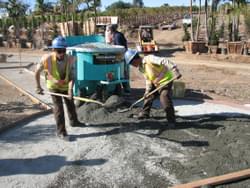




San Diego County partnered with the California Conservation Corps to develop an accessible trail surfaced with hardened crushed granite material from TechniSoil LLC.

By Amber Goodenough
The Otay Valley Regional Park in San Diego, California has completed upgrades to 13.2 miles of multi-use trails, known as the Palm Avenue Trail. This trail connects the communities of Otay Nestor to 8,500 acres of open space and the Otay Lakes. According to the County Planning Commission “The park... offers residents and visitors outstanding natural scenic and cultural features, and provides community and regional recreational and educational opportunities.”
To complete the project, the County of San Diego Department of Parks and Recreation partnered with the California Conservation Corps (CCC)— a state run organization that hires youth (18-25 year olds) to restore and protect California's environment— to build the trail.
The CCC, established in 1976, is the oldest and largest state conservation corps program in the country and is a cost-effective labor force that tackles more than 900 projects annually and works with more than 250 local, state and federal agencies each year.
The County of San Diego has had a long standing partnership with the CCC and as Chuck Tucker, project manager for the County of San Diego said, “The CCC crews and the crew supervisors are excellent to work with as they have the skills, knowledge and abilities to perform this hard work and provide excellent results.”
This mutually beneficial partnership actually saved the county a considerable amount of time and money by avoiding the high costs associated with professional bids, designs and construction management typically required for this type of project. These high costs were avoided due to the fact that the CCC is considered an educational program for youth and they are exempt from prevailing wage requirements for labor.
In addition to the cost-savings, the Palm Avenue project was an excellent learning opportunity for the CCC crew. While the CCC typically builds non-paved, or natural surface trails, this project gave them an opportunity to build a hardened crushed granite trail comparable to asphalt or concrete. They were also able to learn high-level construction techniques and receive hands-on training with state of the art materials and equipment such as the Trailblazer 900 mixer. The mixer was used to develop a 500 square foot vista point, made of crushed granite mixed with a G5 hardener developed by TechniSoil LLC. The trail and the overlook were designed and built to protect the identified sensitive habitat of the surrounding area.
The Palm Avenue Trail was a test case by San Diego County to verify the potential for developing less expensive trails. Ideally, they wanted a trail with a natural look and feel but that required little maintenance. TechniSoil’s G5 stabilizer was the perfect solution for this type of trail because it maintains the natural aesthetic but has the durability of asphalt.
G5 is also slip-resistant and provides a durable surface for any type of traffic including, wheelchairs, strollers, bikes and even cars and trucks. The Palm Avenue trail, built with G5 stabilizer, will have a minimal impact on the environment and require virtually no maintenance.
The Palm Avenue trail was funded by a private donor through the San Diego Foundation in the amount of $57,000 and by donations from, Lehigh Hanson Aggregates, who donated 300 cubic yards of crushed stone aggregate. TechniSoil North America also donated over 1,000 gallons of G5 stabilizer and the Trailblazer 900 mixer to mix and lay the decomposed granite on-site.
Later on the CCC will construct 22 miles of trail in the Tijuana River Valley Trails System and another 2.5 miles of trail for the Historic Flume Trail in East San Diego County.
The collaboration between the CCC and the County of San Diego proved to be not only economically beneficial to the trail managers but was also completed in less time thanks to the advanced technology available to the crews.
Amber Goodenough is Director of Marketing for TechniSoil Global Inc. Contact her at [email protected] or (530) 605-2082.